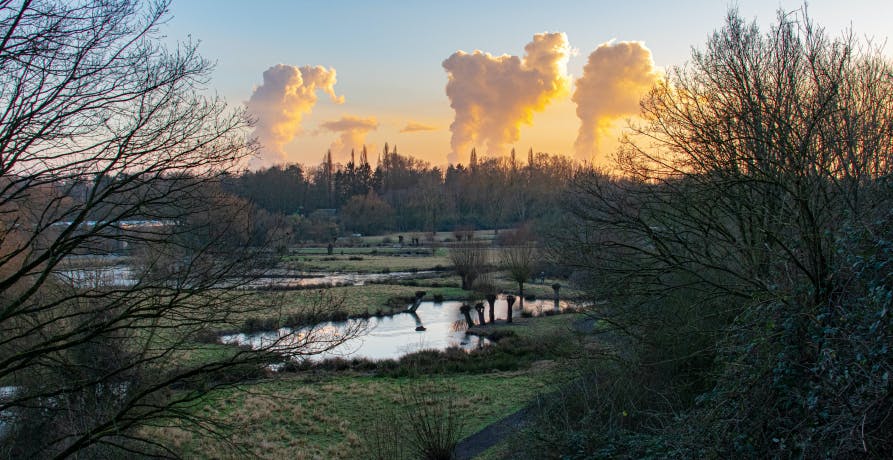
Impacts, Risks, and Opportunities (IRO) for CSRD Reporting
In this article, we’ll break down what IROs are, how to identify and assess them, and what CSRD requires in terms of disclosure.
ESG / CSR
Industries



In 2021 the UK Government called on “all small businesses to lead the charge to net zero” through the launch of its Together for our Planet Business Climate Leaders campaign. The campaign asked small businesses to pledge to cut their emissions in half by 2030 and to net zero by 20250. The UK Business Climate Hub is a resource to help small businesses reach these targets by providing advice, resources and toolkits to support businesses as they start their journey to net zero.
👉 In this article we’ll explore the UK Business Climate Hub in more detail, and look at the different ways it can help businesses to reduce their emissions.
Under the banner of this campaign, the UK Government called on small businesses across the UK to take steps to half their greenhouse gas emissions by 20320, and net-zero emissions (compared to 1990 levels) by 2050. But while most businesses will understand why it’s important to reduce their carbon footprint, it’s not always clear what exactly they need to do to achieve this. This is where the UK Business Climate Hub comes into play.
The UK Business Climate hub is the UK’s adoption of the SME Climate Hub which was founded by the UN’s Race to Zero campaign, the We Mean Business Coalition, the Exponential Roadmap Initiative, and the International Chamber of Commerce. The SME Climate Hub is a global platform for SMEs (SME = small and medium enterprises) to make a commitment to join the UN’s Race to Zero campaign. It allows participating SMEs to access tools and resources to help them reduce their environmental impact and to future proof their business.
The UK Business Climate Hub is the UK iteration of the SME Climate Hub. It’s a landing page that allows the UK Government to engage with and support UK SMEs as they look to reduce their emissions. A one-stop-shop with tools, resources and information to help SMEs take action. Aimed at a UK audience, it shares inspiring stories of other SMEs who have already signed up to the commitment and who have made progress in cutting down their carbon emissions.
👉 The UK Business Climate Hub aims to help UK businesses of under 250 employees to future proof their business, build resilience in their supply chains, and align with ever changing governmental policies, while also accelerating their business growth. Alongside its own resources and tools, the UK Business Climate Hub links businesses up to the SME Climate Hub tools library, as well as the SME Climate commitment.
In recognition of the fact that “climate change poses a threat to the economy, nature and society at large” the SME Climate Commitment asks companies to pledge to:

After filling out the online forms and making the SME Climate Commitment, the UK Business Climate Hub will get in touch. As a first step they will share tools and information so that businesses can better understand and evaluate their carbon emissions. Then, the next step is to determine how to tackle these emissions, and how to communicate them with customers and the community.
The UK Business Hub will keep in touch and continue to share solutions, support and incentives to help small UK businesses reach their targets.
The UK is changing and there’s no way around it. From regulations that mean you won’t be able to buy new petrol or diesel cars from 2030, to new rules when it comes to building or renovating buildings. The regulatory landscape regarding climate change is constantly changing which means that it can be a bit of a moving target and tricky to understand.
Businesses who sign the UK Business Hub’s commitment will be better placed to deal with these changes. They will receive regular updates that will help them to stay on top of developments, which means that they can better understand and prepare for any changes that might affect their business.
Cutting back on carbon emissions means that businesses will also make savings on their utility bills, so any effort to reduce emissions will result in direct savings to their business. Not only this, but businesses who embrace green practices and commit to emissions reductions will benefit from a competitive advantage. Savvy consumers are now actively looking to buy or engage with businesses who have an environmental conscience.
Businesses who sign up to the commitment will be able to display the Business Climate Hub’s logo, which will alert customers to the fact that the business has committed to reducing their emissions.
Even though most of us are aware of the threat that greenhouse gas emissions present to our climate, and most of us truly want to help, it’s often difficult to know where to start. By signing up to the commitment businesses will receive information and support to get them started on their journey.
The UK Business Climate Hub provides sector specific steps that have been designed by industry experts to help businesses cut down on emissions, as well as more general advice. To find out more about the industry specific steps, we suggest that you take a look at UK Business Climate Hub’s website directly. We’ll give an overview of the more general steps that SMEs can take below:

In addition to these tips and the resources and toolkits found on the website, a business who commits to the SME Climate Commitment will also be given free access to an online course called ‘Climate Fit’. It aims to help businesses who consider themselves to be complete beginners when it comes to reducing their carbon emissions. The course is made up of seven different sections and provides a step by step guide for businesses to follow. It also contains lots of case studies so that businesses can see how their actions will benefit not only the environment and local community, but also their bottom line through cost savings.
In addition to all the resources found on the UK Business Climate Hub, the website also links through to the SME Climate Hub which has some great tools that enable SMEs to take concrete steps towards climate action. For example, it includes guidance on:

Businesses, with less than 250 employees who are interested in reducing their own carbon footprint and turning their business green, should head to the UK Business Climate Hub where they can find a variety of information, tools and resources to get them started on their journey.
Once ready they can sign up to the SME Climate Commitment, and join businesses across the UK and the world as they start their net zero journey.
At Greenly we can help you to assess your company’s carbon footprint, and then give you the tools you need to cut down on emissions. Why not request a free demo with one of our experts - no obligation or commitment required.
If reading this article has inspired you to consider your company’s own carbon footprint, Greenly can help. Learn more about Greenly’s carbon management platform here.